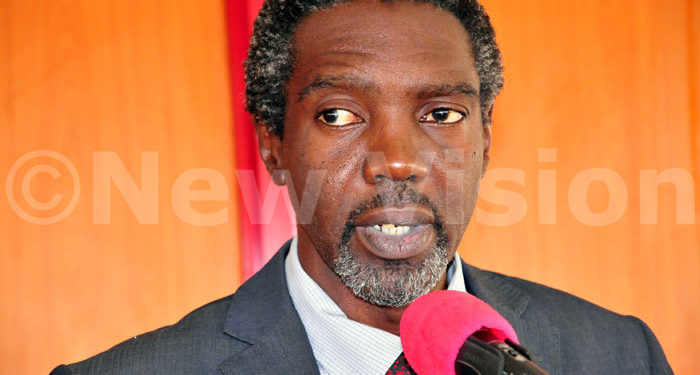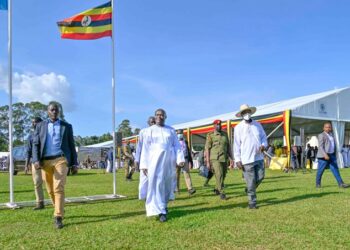The President of the Uganda People’s Congress, Jimmy Akena Obote, is frustrated by the lack of necessary political will to combat corruption. Here’s his analysis:
Over the years, Museveni has made over 100 public statements about fighting corruption and has outlined various interventions and strategies. Some notable instances include:
1. 1986: Identified corruption as one of Uganda’s six major problems (New Vision)
2. January 1998: Announced the establishment of the Inspectorate of Government to fight corruption (Monitor)
3. April 2001: Criticized corrupt officials and vowed to take stern action (New Vision)
4. July 2005: Launched an anti-corruption hotline for citizens to report corruption (Monitor)
5. October 2006: Called for the prosecution of corrupt officials regardless of their positions (New Vision)
6. March 2008: Emphasized the importance of integrity among public servants (Monitor)
7. December 2009: Addressed the need for stronger institutions to combat corruption (New Vision)
8. June 2011: Announced new measures to tackle corruption within the police force (Monitor)
9. February 2012: Called for the resignation of corrupt ministers (New Vision)
10. August 2013: Introduced whistleblower protection laws to encourage reporting of corruption (Monitor)
11. October 2014: Criticized the judiciary for the slow handling of corruption cases (New Vision)
12. June 2015: Launched a nationwide anti-corruption campaign (Monitor)
13. March 2016: Addressed Parliament on the need for stricter anti-corruption laws (New Vision)
14. July 2016: Commended the role of civil society in fighting corruption (Monitor)
15. November 2016: Announced the creation of special anti-corruption courts (New Vision)
16. April 2017: Called for lifestyle audits of public officials to curb corruption (Monitor)
17. August 2017: Emphasized zero tolerance for corruption during an Independence Day speech (New Vision)
18. December 6, 2018: Admitted miscalculation in trusting elected officials to fight corruption (New Vision)
19. February 2019: Announced a new anti-corruption strategy during the State of the Nation Address (Monitor)
20. May 2019: Called for greater public involvement in anti-corruption efforts (New Vision)
21. July 2019: Addressed the business community on the impact of corruption on investment (Monitor)
22. November 2019: Launched a new anti-corruption task force (New Vision)
23. March 2020: Called for the digitalization of government services to reduce corruption (Monitor)
24. July 2020: Announced a crackdown on corruption in the health sector amid COVID-19 (New Vision)
25. November 2020: Vowed to prosecute corrupt officials regardless of political affiliation (Monitor)
26. January 2021: Emphasized the importance of integrity during a campaign rally (New Vision)
27. June 2021: Inaugurated a new anti-corruption unit in the State House (Monitor)
28. August 2021: Addressed the need for public sector reforms to fight corruption (New Vision)
29. October 2021: Announced new measures to tackle corruption in the education sector (Monitor)
30. December 2021: Called for stronger international cooperation in fighting corruption (New Vision)
31. February 2022: Criticized leniency in handling corruption cases (Monitor)
32. May 2022: Emphasized the role of technology in combating corruption (New Vision)
33. July 2022: Addressed youth on the importance of fighting corruption (Monitor)
34. October 2022: Announced a partnership with the private sector to tackle corruption (New Vision)
35. December 2022: Called for stronger laws against corruption in infrastructure projects (Monitor)
36. March 2023: Announced new anti-corruption initiatives during a Women’s Day speech (New Vision)
37. June 2023: Criticized civil servants for rampant corruption during the State of the Nation Address (New Vision, Nilepost News)
38. October 2023: Called for greater accountability in public procurement processes (Monitor)
39. December 2023: Addressed Parliament on the need for comprehensive anti-corruption reforms (New Vision)
40. March 2024: Urged newly appointed ministers to fight corruption and mobilize for wealth creation (Monitor)
41. April 2024: Announced a crackdown on corruption in tax collection (New Vision)
42. June 2024: Emphasized the need for public participation in anti-corruption efforts (New Vision)
43. 1996: Emphasized the need for transparency in government to combat corruption (New Vision)
44. March 1997: Advocated for the establishment of an independent anti-corruption body (Monitor)
45. September 2000: Announced reforms in public procurement to reduce corruption (New Vision)
46. May 2002: Called for harsher penalties for corrupt officials (Monitor)
47. November 2003: Launched a campaign to promote ethical behavior among public servants (New Vision)
48. January 2004: Introduced anti-corruption education in schools (Monitor)
49. March 2005: Emphasized the importance of public accountability (New Vision)
50. July 2007: Criticized the misuse of public funds and vowed to take action (Monitor)
51. November 2008: Called for increased funding for anti-corruption agencies (New Vision)
52. February 2010: Advocated for the use of technology to track government spending (Monitor)
53. June 2012: Launched a new initiative to promote transparency in government projects (New Vision)
54. October 2013: Announced the formation of anti-corruption committees at the district level (Monitor)
55. April 2014: Called for international support in fighting corruption (New Vision)
56. August 2015: Criticized the slow pace of anti-corruption investigations (Monitor)
57. December 2016: Introduced measures to improve whistleblower protection (New Vision)
58. March 2017: Announced reforms in the judiciary to expedite corruption cases (Monitor)
59. July 2018: Called for a national dialogue on corruption (New Vision)
60. January 2019: Emphasized the need for moral integrity among leaders (Monitor)
61. May 2020: Announced measures to improve transparency in public service delivery (New Vision)
62. September 2021: Criticized the culture of impunity in public service (Monitor)
63. November 2022: Called for greater civil society involvement in anti-corruption efforts (New Vision)
64. February 2023: Emphasized the role of education in curbing corruption (Monitor)
65. June 2023: Advocated for community-based anti-corruption initiatives (New Vision)
66. October 2023: Called for the establishment of an anti-corruption tribunal (Monitor)
67. December 2023: Announced measures to improve transparency in government contracts (New Vision)
68. January 2024: Criticized the lack of political will to fight corruption (Monitor)
69. March 2024: Launched a public awareness campaign on the impact of corruption (New Vision)
70. May 2024: Called for stricter enforcement of anti-corruption laws (Monitor)
71. June 6, 2024: Reiterated commitment to fighting corruption during the State of the Nation Address (New Vision, PML Daily)
Key Questions
1. Is there genuine political will within the NRM to address corruption, or is it merely a facade?
2. How can Museveni ensure that anti-corruption measures are implemented effectively and not just on paper?
3. What mechanisms will be put in place to protect whistleblowers and ensure transparency in government dealings?
4. How will the government address the disparity between elites’ wealth and the general populace’s poverty?
5. Can the NRM genuinely reform itself, or is the corruption too deeply embedded within its ranks?







Discussion about this post